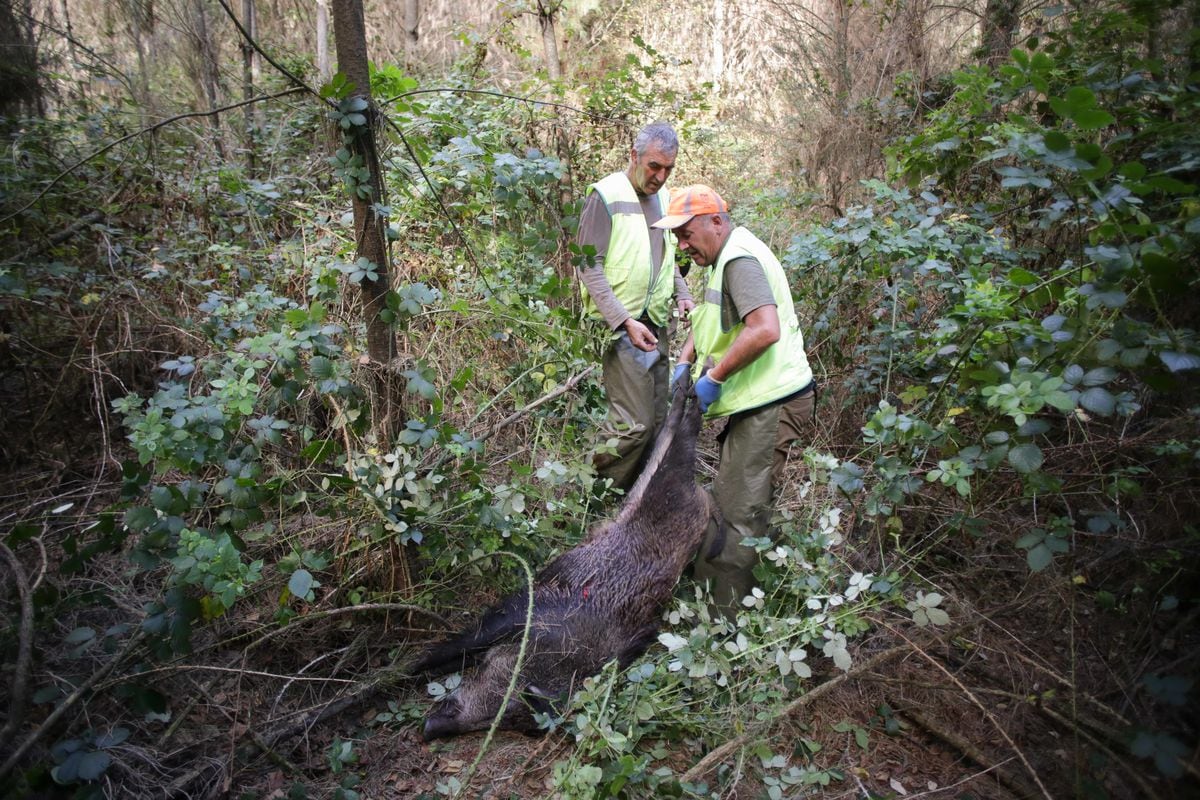Packaging plant of the Costa meat group.Ivan Raga
It was the last years of the sixties when José María Costa and his brother Eduardo decided in Fraga, Huesca, to set up the company Piensos Costa to dedicate themselves to the purchase and sale of cereals. From its position as feed suppliers, the Costa Group gradually became involved in the pig sector with the start-up of its first farms. Half a century later, what began as an experience in the shadow of a cereal warehouse is today the third largest livestock group in the European Union and the second in Spain in white pigs with 150,000 sows, the slaughter of 3.6 million pigs and almost 60 million chickens. It has come to occupy fourth place in the meat industry sector with a total of 4,700 jobs, a turnover of more than 1,500 million euros, and a presence in a hundred countries.
"You have to go back to the sixties and to the culture that existed then when each person raised pigs at home, what was called "backyard rearing," says Jorge Costa, son of José María, general manager of the group where his other six brothers also work. In this context, he points out, the first farms began to be created, which meant that ranchers were totally dependent on the animals 365 days a year. “At Piensos Costa we thought that we should change the model to a larger farm in order to professionalize the sector and improve the quality of life of both the animals and the farmers with a management that included weekly rest periods, the possibility of sick leave or vacation.It can be said that we were pioneers in the development of the vertical integration system in order to professionalize the activity and give greater visibility to production”.
In the seventies, the pig sector began a profound process of transformation, going from more than 200,000 small farms, dominated by mini family farms, to the little more than 80,000 that currently exist, but which have placed the pig sector as the second largest producer in the European Union with more than five million tons and as one of the largest exporters with more than 2.5 million tons.
In the case of the Costa Group, this system known as vertical integration where the farmer provides the installation and the work in exchange for remuneration and the integrator the animals, feed and other services, was launched by the company especially since 1977. It had a first phase of development until 1982 and the model that has been maintained until today. Today, the Group already has a total of 850 farms, approximately 50% of which are its own farms and the other half mainly integrated in the Autonomous Communities of Aragón, Catalonia, Castilla y León and Navarra, for which it produces more than four million kilos of feed daily in its four factories.
Consolidated the system of production of its own raw material in pigs, the Costa Group began in the last decade the process of going from being just farmers, to laying the first stone to build an agro-industrial group in a strategy that went from a policy of integration vertical, to a circular process that goes from the breeding of the pig to its transformation and industrialization with its own companies. "A great challenge for us has been, says Jorge Costa, transforming our livestock group management into a more global commitment as an industrial agri-food group, joining large-scale distribution, betting more on innovation, not only on the farms, but also in the development of new products. This allows us to supervise the traceability of our offer from beginning to end,jointly benefiting sustainability and the environment, as well as promoting healthy eating, all based on the work of our teams”.
The transition from the farm to the table of the Costa Group to have half a dozen meat industries took off in 2016 with the purchase of the Catalan firm Costa Meat Food, dedicated to the cutting and sale of fresh meat and which operated with some 170 million kilos in fifty countries. A year later, the Aragonese group acquired the Casademont company, a specialist in fuet and cured sausages. In 2018 it acquired Cárnicas Villar, a specialist in Iberian pork with dryers in Badajoz, a purchase that was followed by the firm La Nuncia in Toledo, specialized in processed and fresh products. In 2020, it acquired 50% of Aviserrano in the poultry and turkey sector, with some 400 farms and a production of almost 60 million units. Finally, in 2021 the Costa Group acquired the Roler firms, specialized in fresh meats,as well as hamburgers and sausages to close the acquisitions for the time being with the purchase of La Alegría from Rioja, specialized in the manufacture of traditional sausages, and that of Juan Luna, a leading Valencian company in the manufacture of sliced meats. The investments made in all these purchases remain in the company as the best kept treasure.
“We do not rule out more purchases because there are always those who want to sell and we are willing to buy if it fits into our strategy of building an increasingly strong and consolidated group.
But, for the moment, we are thinking more about a consolidation process after the last operations”, pointed out Jorge Costa last December.
Today he has just acquired another firm, the Valencian sliced Juan Luna from the Nazca fund, which adds a turnover of 55 million euros.
After this purchasing process, the group has gone from billing less than 700 million to exceeding 1,500 million euros.
Of this volume, approximately 40% comes from the activity on the farms and the rest from the transformation and industrialization processes of processed products, where each year those of the fourth range (processed) are gaining weight.
In a simplified x-ray of the group, in the livestock segment it operates with 850 pig and 400 poultry farms, handles 150 million kilos of pork and 125 million kilos of poultry, produces 1,250,000 pieces of ham and more than 60,000 tons of processed products.
As if that were not enough, the group incorporates real estate, automobile businesses and the Sommos winery in Somontano with 400 hectares of vineyards.
Animal welfare
Manure discharges and animal welfare have been two of the challenges and, in many cases, pending issues in the pig sector and complaints from animal organizations and environmental movements in semi-abandoned Spain.
In the case of slurry discharges, faced with the possibility of installing plants for its transformation into biogas, the group has opted for its application in the field as it considers that it is the most appropriate if it is done with the proper controls. . Its managers justify this strategy by being the farms with a correct management in the territory in accordance with the regulations in force.
In terms of animal welfare, in 2018 the group became the first white pig company with the AENOR Welfair certification, as well as the Interporc interprofessional seal and the antibiotic-free certification. In this direction, in the last year it has participated in the Human Animal Interaction project, HAI, an initiative supported by artificial intelligence promoted by research organizations, the sector and the Administrations to capture by video the behavior of animals in their relationship with humans. The system allows knowing the reactions of the animals to the pace of work of the keepers, the color of their clothes, the light or the ambient music of the farm and to see if they are friendly, trustful, distrustful, fearful or protective. for, from there,make improvement decisions. “Animals deserve the same respect as the consumer” adds Jorge Costa.

/cloudfront-eu-central-1.images.arcpublishing.com/prisa/PVMIVFFT6FC6ZGWUEBKLH36T5U.JPG)



/cloudfront-eu-central-1.images.arcpublishing.com/prisa/JNKEYSPVIXFSA66UHYKQUNTSQA.jpg)


/cloudfront-eu-central-1.images.arcpublishing.com/prisa/5OEFXRUP6BFYRM3645I2WOWNVQ.jpg)






